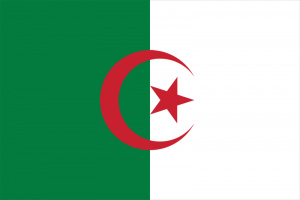Language/Algerian-arabic/Grammar/How-to-Use-Be
Hi Algerian Arabic learners! 😊
In this lesson, we will focus on how to use "be" in Algerian Arabic. This is an important verb in any language, and mastering its usage will help you communicate more effectively. We will cover its different forms, and provide some cultural context to help you understand how to use it in everyday conversations.
What is "be"?
"Be" is a verb that is used to describe a state of being. In Algerian Arabic, it has several forms depending on the subject of the sentence. Let's take a look at these forms:
| Algerian Arabic | Pronunciation | English |
|---|---|---|
| كُنْ | ku(n) | was/were |
| هُوَ/هِيَ/هُمَا | hwa/hya/huma | is/are |
| أَنَا | ana | am |
| أَنْتَ/أَنْتِ | anta/anti | are |
- Note: In Algerian Arabic, the letter " ك " (k) takes the function of "be" in some circumstances. It can also mean "become".
Let's see some examples to understand better:
Using "كُنْ" (ku(n))
- Ali كان في البيت (Ali kān f el-bayt) - Ali was at home.
- الطقس كان جيدًا البارحة (Ttqass kān jaydān l-bāreha) - The weather was good yesterday.
Using "هُوَ/هِيَ/هُمَا" (hwa/hya/huma)
- هو أستاذ (Huwa astāz) - He is a teacher.
- هي تلميذة (Hiya tlmiżdha) - She is a student.
- هما متزوجان (Huma mtzwjjān) - They are married.
Using "أَنَا" (ana)
- أنا مرتاح (Ana mrtāḥ) - I am relaxed.
- أنا طالب (Ana ṭālb) - I am a student.
Using "أَنْتَ/أَنْتِ" (anta/anti)
- كيف حالك؟ أنتِ بخير؟ (Keif ḥālk? Anti bkhēr?) - How are you? Are you well?
- أنتَ موظف؟ (Anta mūżaff?) - Are you an employee?
Using "be" in cultural contexts
Now that we know how to use "be" in Algerian Arabic, let's see some cultural contexts where it might be used.
In Algeria, people often ask about your well-being, and it is considered customary to inquire about the health of your family members as well, especially your parents. To ask about someone's health, you can say: "كيف حالك؟" (Keif ḥālk?) which means "how are you?".
Another cultural context where "be" might be used is in describing food. Algerian cuisine is known for being diverse and flavorful, and "be" can be used to describe the taste of different dishes. For example, you can say "الحريف بالجاج كان جد لذيذ" (El-ḥarif b l-jāj kān jdīd lzīz) which means "The Harif with chicken was very delicious." Harif is a traditional Algerian dish made with a combination of spices and grains.
In addition to its usage in Algerian Arabic, "be" is also an important verb in many other languages including English, French, and Spanish. Learning how to use "be" effectively will not only help you communicate better in Arabic, but it will also improve your overall language skills.
Dialogue
To see "be" in context, let's have a dialogue:
- Person 1: كيف حالك؟ (Keif ḥālk?) - How are you?
- Person 2: أنا بخير، شكرًا. وأنت؟ (Ana bkhēr, shukran. Wanta?) - I'm fine, thank you. And you?
- Person 1: أنا كذلك، شكرًا. (Ana kadhlik, shukran.) - Same here, thanks.
- Person 2: هل تحب الأكل الجزائري؟ (Hal tḥubb el-ekl el-jazā’erī?) - Do you like Algerian food?
- Person 1: نعم، أحب الكسكسي كثيرًا. (Naʿam, aḥubb el-ksksī kthīrān.) - Yes, I love couscous a lot.
- Person 2: لقد جرّبت الحريرف قبل؟ (Lqad jrħbt el-ħarrīf qbl?) - Have you tried Harif before?
- Person 1: لا، ما هو؟ (Lā, mā hu?) - No, what is it?
- Person 2: الحريف هو طبق تقليدي جزائري، وذوقه لذيذ جدًا. (El-ḥarrīf hu ṭabq tqlydī jazā’erī, w ḏūqhu lzīz jdān.) - Harif is a traditional Algerian dish, and its taste is very delicious.
Conclusion
In this lesson, we learned how to use "be" in Algerian Arabic in its different forms, and we provided cultural and contextual examples. Remember to practice using "be" in your conversations, and do not hesitate to ask questions to find native speakers. For more grammar lessons, you can visit our Grammar page. We hope you found this lesson useful in improving your Algerian Arabic skills. 😎
➡ If you have any questions, please ask them in the comments section below.
➡ Feel free to edit this wiki page if you think it can be improved. 😎

